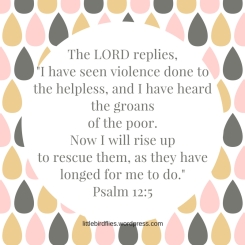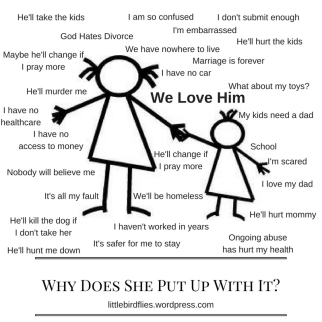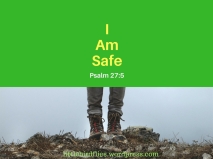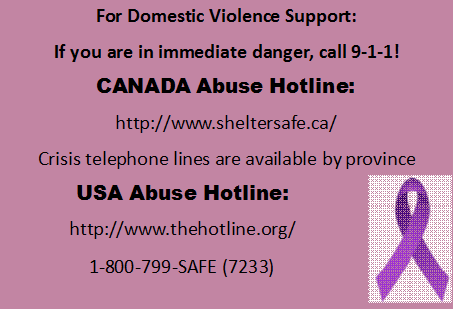
If you are in immediate danger, call 9-1-1.
For anonymous, confidential help, 24/7, please call the National Domestic Violence Hotline at 1-800-799-7233 (SAFE) or 1-800-787-3224 (TTY).
Just to clear things up…The biggest reason a victim stays with her abuser is that she firmly believes that it will get better. Hope is paralyzing. The hope that she can make it better, make it work, he will change, he will care someday…is often the core reason that we stay. Until we realize that there is no hope of change, that things are not going to improve and the likely hood that he will change is very slim… then the hope of it getting better dies. When the hope dies we stop falling for the lies. When he romances us, honeymoons us etc. then we won’t fall back into the hope but will be able to recognize the cycle of abuse that keeps sucking us back into the relationship.

When finally that hope has been dashed and we realize that nothing we say or do will make our partner treat us better, then we face choices. The choices are overwhelming and sometimes it seems like there really are no choices at all.
I decided to share this post with you at the very beginning of the holiday season because we know, as DV advocates that the holidays are rife with increased calls to domestic violence hotlines and the shelters are full. We understand that crisis happens and often it happens during the holiday season.
So, what should you do once you decide to get you and/or your children to safety?
- Reach out to your local women’s shelter or domestic violence organization. Breaking your enforced isolation is the first step to freedom. Reaching out to someone who you know is safe is imperative. Yes, we encourage you to tell a safe friend, a pastor or a family member but they won’t likely know how best to help you and they are almost certainly not trained to counsel you. Your local shelter is available to you, free of charge, even if you never move into the shelter. They often provide an emergency hotline, physical shelter, counseling, advocacy and many more referral services that can enable you to access the help you need as you go through your journey. You can easily find a local and experienced shelter by entering your postal code at this site DomesticShelters.org
- Request that your domestic abuse advocate goes through a safety plan for you. Each safety plan is individual for each person. Your situation is unique and we want to make sure that you are emotionally and physically safe. Your advocate will be trained on what questions to ask you to help you think through your safety at home, at school, at work and in case any violent situation were to happen. It really is very helpful to have a good safety plan so that you aren’t scrambling in case your/your children’s safety were to become compromised.
- Make a safety bag and store it somewhere away from your home. A safety bag is necessary in case things at home go bad before your getaway plan can be completed. If you have to run out of the house quickly, then you will be assured that you don’t have to stop and pack a thing. Sometimes, women believe that their abuse would never become physically violent. Those of us who work in the field see consistently that when a victim is mentally and emotionally preparing to leave, the violence increases. The abuser innately knows and increases his methods of control. Trust me, make a safety bag and if you never need it then praise the Lord. However, it isn’t too hard to make one and even if you think you’ll never need it, if you do end up using it, you’ll be glad you took the time to do it. So, you may ask, what should I put in my safety bag? Here is a quick list of some of the most important items. Important Paperwork

● Birth certificates and social security cards for yourself and your children
● Driver’s license and/or passports
● W2s and pay stubs
● Work permits
● Government benefits card
● Green card or immigration papers
● Marriage, divorce and custody papers
● Legal protection or restraining orders and records of any police reports you have filed
● Health insurance cards and medical records
● Your children’s school records
● Immunization records
● Financial records and bank account numbers
● Apartment rental agreement or lease, or house deed
● Car title, registration, and insurance documentation
Tip: Keep photos of these documents in a secure digital file. In some cases, photos will be sufficient proof of documentation, and in other cases, the photos will make it easier for you to replace the document if you need to leave without it.
Money
● Cash and prepaid credit cards that can’t be traced
● Credit cards and the PIN numbers you need to withdraw cash
● ATM card
● Checks
● Small valuables you could sell if need be
Communication
● A post office box or safe address where you can forward your mail
● Phone calling card
● Prepaid cell phone or a cell phone with a new contract and number
● Your address book or cell phone contacts
Tip: If possible, secure new doctors, dentists, orthodontists, veterinarians, schools and other locations for yourself, your children and your pets so your abuser can’t find you in those places and make a list of the contact information for each to take with you.
Medical
● Current medications and prescriptions for yourself and your children
● Eyeglasses, contact lenses, hearing aids and any other medical devices you or your children need
Other items
● Pets, their records, and any needed items like food, a leash, bedding, and medication
● Keys
● Clothing
● Small toys or books for your children
● Any keepsakes you would like to have
Tip: Leave a spare set of car keys with someone you trust in case the abuser takes yours to try to prevent you from leaving. (domesticshelters.org) You can also find a printable list at www.womenshealth.gov
- Document, Document, Document….this means that anything that happens verbally, physically, sexually or financially to you that is abusive you should document the time, date and situation. This also means that you can collect items that can prove abuse like financial records, pictures, screenshots, recordings (if its legal in your state) etc. Be very careful and do not put yourself in harm’s way!
- Educate yourself on abuse. Read books, websites, and blogs so that you can support yourself and remain strong. This is the hardest time and knowing what you are doing is the right thing for you is very important! I recommend starting with Patricia Evans “The Verbally Abusive Relationship” and Lundy Bancroft “Why Does He Do That? Inside the minds of angry and controlling men”. Be very careful and discrete about your books and online activity as you probably do not want to take the chance of getting caught. Even with all your new found knowledge and power never accuse your abuser to his face of abuse or anything else that will put you in harm’s way.

- Now you are ready to start making your ‘get safe’ plan. Where will you go? How will you get there? What about a job? school? your children? All of these things can feel very overwhelming but your advocate who you met in step 1 will be able to help you think through each step you choose to take. She’ll also be able to help you maintain your personal safety as you start to plan your escape.
- Try to build a ‘nest egg’. Usually, victims of abuse are financially abused and have very limited access to finances. If you can squirrel away a few dollars, sell a few items or access the bank account do it safely so that you have a bit of money to fall back on when he cuts you off from all financial access.
- Keep planning the details with your advocate. You are almost there and all your ducks are almost quacking in a row! You can do it. You might start feeling really afraid the closer you get to your target ‘safe’ date. This is normal. Plug into your support group who are helping you. Share your feelings, talk about them with safe people for support. Revisit the reasons you want to leave so that you remember why you are doing this.
- Don’t be afraid to bail on your plan for safety. Sometimes a victim has to bail on the plan. I once tried to leave and got caught in the middle of walking down the stairs. I had to think and act fast in order to maintain my safety. It was heartbreaking but kept me safe and allowed me to try again later. It’s okay if you have to NOT leave in order to stay safe.
- The day has come and its time to fly. Rely on your plan, your support and your God as you go through what will probably be one of the hardest days of your life! You can do this. You are strong and capable! You’ve lived through hell already, now it’s time to reach for heaven.
Now that you are free, Take the time you need to heal. Access support groups, counseling, and your faith community. It takes at least 1 year to go through the immediate crisis healing. Don’t rush it. Remember that you are grieving the loss of a relationship that was important to you. It will take time to grieve and recover. Circle your wagons, look after you and if you have children you can help them grieve and recover as well. Stay in touch with you advocate. She can help you with job training, going back to school, housing, WIC and food stamps. She can also help with referrals to a lawyer and legal advocate.
This is just a recommendation of how to go about the process of planning to leave. Each and every story is different and therefore will require specific planning that relates to your situation. You can rest assured that many of us went through this process and survived. We are a sisterhood who are here to support you and love you. You are worth it and you can do it!!
Like a bird that flees its nest is anyone who flees from home. Prov 27:8


Reblogged this on Talmidimblogging.
LikeLike